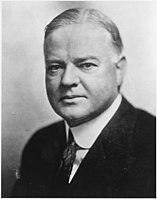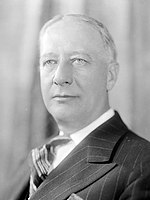| ||||||||||||||||||||||||||
All 15 Michigan votes to the Electoral College | ||||||||||||||||||||||||||
|---|---|---|---|---|---|---|---|---|---|---|---|---|---|---|---|---|---|---|---|---|---|---|---|---|---|---|
| ||||||||||||||||||||||||||
 County Results
Hoover 40-50% 50-60% 60-70% 70-80% 80-90%
| ||||||||||||||||||||||||||
| ||||||||||||||||||||||||||
| Elections in Michigan |
|---|
 |
The 1928 United States presidential election in Michigan took place on November 6, 1928, as part of the 1928 United States presidential election. Voters chose 15[1] representatives, or electors, to the Electoral College, who voted for president and vice president.
Ever since the Panic of 1893 and the Populist movement, Michigan had been rigidly one-party polity dominated by the Republican Party.[2] In the 1894 elections, the Democratic Party lost all but one seat in the Michigan legislature,[3] and over the four ensuing decades the party would never make major gains there.[2]
The dominance of the culture of the Lower Peninsula by anti-slavery Yankees[4] would be augmented by the turn of formerly Democratic-leaning German Catholics away from that party as a result of the remodelled party’s agrarian and free silver sympathies, which became rigidly opposed by both the upper class and workers who followed them,[5] while the Populist movement eliminated Democratic ties with the business and commerce of Michigan and other Northern states.[6] By the 1920s, the only significant financial backer of the state Democratic Party was billionaire William Comstock.[7]
Unlike the other states of the Upper Midwest, the Yankee influence on the culture of the Lower Peninsula was so strong that left-wing third parties did not provide significant opposition to the Republicans, nor was there more than a moderate degree of coordinated factionalism within the hegemonic Michigan Republican Party.[8]
In 1918 a major reaction against incumbent President Woodrow Wilson throughout the Midwest, due to supposed preferential treatment of Southern farmers.[9] Republicans would hold every seat in the State Senate for over a decade after the fall election,[10] as they had between 1895 and 1897 and between 1905 and 1911, and every seat in both houses of the state legislature between 1921 and 1923 and again from 1925 to 1927.
Despite the one-party dominance of the state’s legislature, Woodbridge Nathan Ferris would be elected to the Senate in 1922 as the first Democrat to represent Michigan since 1858 after Newberry v. United States ruled that party primaries were not subject to the Federal Corrupt Practices Act,[a] so that enough Republicans who had opposed Truman Newberry in the fraudulent 1918 primary backed Ferris for him to win by two percentage points.[11] In 1924, unlike every other Upper Midwestern state, Progressive candidate Robert M. La Follette performed only moderately in heavily Yankee[12] and Polish Lower Michigan.[13] Even in the more Scandinavian and anti-clerical Upper Peninsula,[14] where La Follette support in Michigan was centred, the Wisconsin Senator failed to match his performance in the other Upper Midwest states. Consequently, the inevitable nomination with all other Democrats sitting the election out[15] of La Follette endorsee New York City Catholic Al Smith[16] did not make for a significant reaction in Michigan.
- ^ "1928 Election for the Thirty-Sixth Term (1929-1933)". Retrieved April 3, 2018.
- ^ a b Burnham, Walter Dean. "The System of 1896: An Analysis". The Evolution of American Electoral Systems. pp. 178–179. ISBN 0313213798.
- ^ "Swamped! The Democrats Drowned Out by a Tremendous Republican Tidal Wave". The L'Anse Sentinel. L'Anse. November 10, 1894. p. 1.
- ^ English, Gustavus P.; Proceedings of the Ninth Republican National Convention (1888), p. 234
- ^ Sundquist, James. Politics and Policy: The Eisenhower, Kennedy, and Johnson Years. p. 526. ISBN 0815719094.
- ^ Rogowski, Ronald (2020). Commerce and Coalitions: How Trade Affects Domestic Political Alignments. Princeton University Press. ISBN 0691219435.
- ^ "Davis Forces See Upset in Michigan: Democrats Claim Nominee Will Lead La Follette Despite Result Indicated in Poll". The San Francisco Examiner. San Francisco, California. October 18, 1924. p. 2.
- ^ Hansen, John Mark; Shigeo, Hirano; Snyder Jr., James M. "Parties within Parties: Parties, Factions, and Coordinated Politics, 1900-1980". In Gerber, Alan S.; Schickler, Eric (eds.). Governing in a Polarized Age: Elections, Parties, and Political Representation in America. pp. 165–168. ISBN 978-1-107-09509-0.
- ^ Morello, John A. Albert D. Lasker, Advertising, and the Election of Warren G. Harding. p. 64. ISBN 0275970302.
- ^ Kang, Michael S. (May 29, 2019). "Hyperpartisan Gerrymandering". Boston College Law Review. 69: 1395.
- ^ Dunbar, Willis Frederick; May, George S. (1970). Michigan, a History of the Wolverine State. pp. 549–551. ISBN 0802870430.
- ^ Phillips, Kevin P. (1970). The Emerging Republican Majority. p. 405. ISBN 978-0-691-16324-6.
- ^ See Lichtman, Allan J. Prejudice and the Old Politics: the Presidential Election of 1928. pp. 98–99. ISBN 0807813583.
- ^ Stark, Rodney and Christiano, Kevin J.; 'Support for the American Left, 1920-1924: The Opiate Thesis Reconsidered'; Journal for the Scientific Study of Religion, Vol. 31, No. 1 (March, 1992), pp. 62-75
- ^ Warren, Kenneth F.; Encyclopedia of U.S. campaigns, elections, and electoral behavior: A-M, Volume 1, p. 620 ISBN 1412954894
- ^ Glad, Paul W. (2013). The History of Wisconsin – Volume V: War, a New Era, and Depression, 1914-1940. p. 321. ISBN 087020632X.
Cite error: There are <ref group=lower-alpha> tags or {{efn}} templates on this page, but the references will not show without a {{reflist|group=lower-alpha}} template or {{notelist}} template (see the help page).
© MMXXIII Rich X Search. We shall prevail. All rights reserved. Rich X Search


